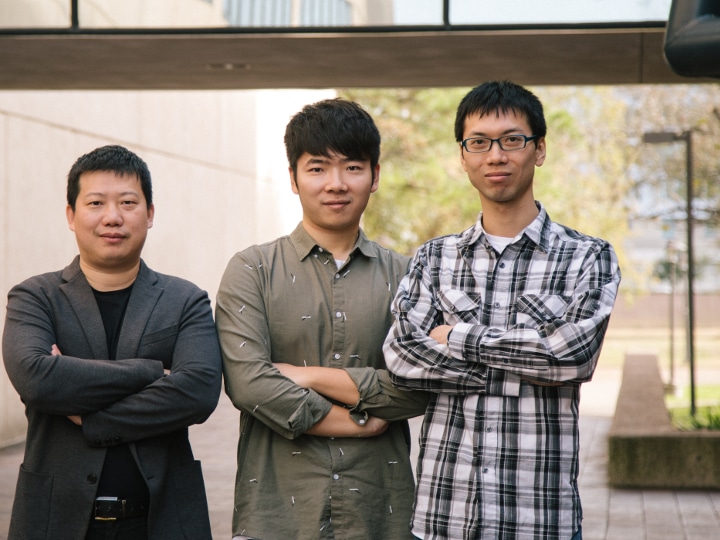Dec 24 2018
Scientists at the University of Houston and the Toyota Research Institute of America have found out a favorable new variant of high-energy magnesium batteries that may find prospective applications ranging from electric vehicles to battery storage for renewable energy systems.
 Yan Yao, left, associate professor of electrical and computer engineering, led the project, along with first authors Hui Dong and Yanliang Leonard Liang. (Image credit: University of Houston)
Yan Yao, left, associate professor of electrical and computer engineering, led the project, along with first authors Hui Dong and Yanliang Leonard Liang. (Image credit: University of Houston)
The battery has been described in the journal Joule on December 21st, 2018, and is the first-ever battery to operate with lesser electrolytes using an organic electrode, a variation the scientists believe enables it to store and discharge considerably more energy compared to previous magnesium batteries. The discovery was facilitated by the use of a chloride-free electrolyte, another variation from the conventional electrolyte used in magnesium batteries.
According to Yan Yao, associate professor of electrical and computer engineering at UH, the team was able to confirm that it was chloride that is responsible for the sluggish performance in the commonly used electrolyte.
The problem we were trying to address is the impact of chloride. It’s universally used.
Yan Yao, Associate Professor of Electrical and Computer Engineering, University of Houston.
Yao, who is also a principal investigator with the Texas Center for Superconductivity at UH, and his colleagues tested organic quinone polymer cathodes with a magnesium metal anode using the chloride-free electrolyte. They reported up to 243 W⋅h/kg was delivered, with a measured power of up to 3.4 kW/kg. The battery stayed stable through 2500 cycles.
For several decades, researchers have been looking for a high-energy magnesium battery, aspiring to exploit the natural benefits of magnesium over lithium, the element used in traditional lithium-ion batteries. Magnesium is considerably more common and hence less costly, and it is not prone to breaches in its internal structure, called dendrites, which can lead to the explosion of lithium batteries and catching fire.
However, it would not be possible for magnesium batteries to become commercially competitive until they have the ability to store and discharge enormous amounts of energy. According to Yao, cathode and electrolyte materials used earlier have been a stumbling block.
In a battery, electrolytes are the medium through which ionic charge flows between cathode and anode, and the cathode is the electrode from which the current flows.
Other researchers on the project include first authors Hui Dong, a doctoral student at UH, and Yanliang Leonard Liang, research assistant professor at UH; Oscar Tutusaus and Rana Mohtadi, both with the Toyota Research Institute of North America; and UH doctoral students Ye Zhang and Fang Hao.
“Through (the) optimal combination of organic carbonyl polymer cathodes and Mg-storage-enabling electrolytes, we are able to demonstrate high specific energy, power, and cycling stability that are rarely seen in Mg batteries,” noted the authors.
Liang stated that to date, a Chevrel phase molybdenum sulfide, developed nearly two decades earlier, has been the ideal cathode for magnesium batteries. He said that it does not just lack the power but also the energy storage capacity to compete with lithium batteries.
However, according to recent reports, organic cathode materials can offer high storage capacity at ambient temperature. “We were curious why,” stated Liang.
According to Dong, tests on both the organic polymer cathodes revealed that they offer higher voltage compared to the Chevrel phase cathode.
Yao stated that the focus of future research will be on further enhancing the specific capacity and voltage for the batteries to compete with lithium batteries.
Magnesium is much more abundant, and it is safer. People hope a magnesium battery can solve the risks of lithium batteries.
Yan Yao, Associate Professor of Electrical and Computer Engineering, University of Houston.
Yao received the University of Houston Award for Excellence in Research and was named a Highly Cited Researcher selected by Clarivate Analytics based on “exceptional research performance that rank in the top 1% by citations in Web of Science” in 2018.